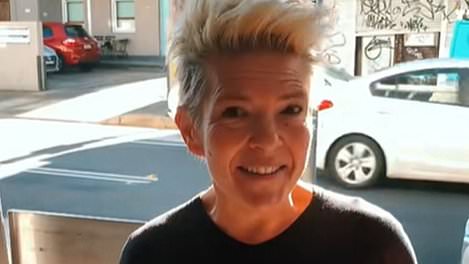The owner of a once bustling vegan butcher shop in Sydney fears her business will soon close amid an emerging trend away from meat-free products.
The shift has resulted in dozens of vegan restaurants closing, companies that made meat alternatives collapsing and supermarkets shrinking their vegan offerings – though those in the industry have struggled to put a finger on why.
Suzy Spoon has run meat-free butcheries that bear her name in the Sydney suburbs of Marrickville and Newtown for more than a decade but business is drying up.
‘Woolworths has reduced our range dramatically and Harris Farm has quartered what they would buy from us before Covid. It’s terrible for our business,’ the entrepreneur told news.com.au.
‘We’re out of money. We’re out of everything, we’re tired.’
She said she has seen other vegan business making a shift to serving up some meat products.
‘But I can’t do that, because that’s just not how I roll. That will never be what I do.’
A shift away from meat had been happening over the last decade. At its peak, one report found that between 2020 and 2023 there was a 47 per cent increase in plant-based meat sales – but over the last two years it seems the bubble has burst.
Companies like Queensland based Fenn Foods that supplied Woolworths and Coles have collapsed and the supermarket giants have failed to strike up deals with new suppliers, leaving their offerings stalling.
Fenn Foods – launched in 2015 by Michelin star chef Alejandro Cancino – employed 32 staff and claimed to be the first certified carbon neutral, plant-based food producer in , but it entered liquidation on October 9.
Once popular hospitality venues like Lentil as Anything and Bodhi in Sydney have shut their doors.
While further south in Melbourne Madam K’s, Transformer and Yong Green Food have gone the same way.
Plant-based chain Lord of the Fries has closed 29 of its 35 locations.
A quick browse of the n Vegan Reddit thread showed that its being noticed by those who adhere to the diet.
‘What happened? For a little while it was awesome being vegan in . But the last few years have been brutal,’ one person said.
‘So many of the best products have been discontinued, the vegan range at the major supermarkets has been reduced and quite a few businesses (restaurants and vegan meal delivery like Herbidoor) have closed down.’
‘I get that Covid was disruptive to supply chains but we’ve been ‘post-Covid’ for years, why haven’t things bounced back?’ another said.
‘Plant-based was considered healthy, then people realised it’s mostly processed foods and the trend now is on whole foods,’ offered a third.
Shannon Martinez of Smith & Daughters told Broadsheet she doesn’t know why vegan venues are struggling but has her theories.
She said while ns are eating less meat it’s not translating to vegan restaurants where it might be harder to please every guest in a dining party.
She added that corporate events, big money spinners for hospitality venues, aren’t held at vegan haunts and that much of their core audience is located in less affluent suburbs who are getting harder hit by cost of living pressures.
A report from September last year found that despite sales of meat-free products stalling, 79 per cent of ns are meat-free at least one day per week.
The report, commissioned by not-for-profit think tank Food Frontier, said the figure is down slightly from 2021.
There was also notable shift in the motivators behind the move away from meat said Food Frontier boss Simon Eassom.
‘The main reason for meat reduction in 2021 were health reasons, and whilst that’s still the predominant reason, budget concerns are a much bigger factor now, and also environmental concerns,’ he said.
More than half of the respondents cited budgetary constraints around their decisions over their food purchases and their diet.
‘Over the past four years, the importance of budget as a motivator for reduced meat consumption has increased significantly, rising from 40 per cent in 2021 to 54 per cent in 2024.’
‘The supermarkets have told us that people are cutting down from more expensive cuts of meat to cheaper cuts of meat,’ Dr Eassom said.
Flexitarian, meat reducing, vegan, and vegetarian diets were popular, with 43 per cent of the ns interviewed eating less meat or none.
Sydney dietician Nicole Senior said she’s observed people moving away from meat because of the rising cost of living.
‘Within my community in Western Sydney, I’m hearing a lot, that people can’t afford meat, and the meat that they’re buying is more processed because it’s cheaper,’ she said.
The survey also found that a further one in ten people are planning to reduce their meat consumption, although there was no indication as to when that might be.
‘It doesn’t mean to say that people are looking to replace meat in every meal, they might still consume meat in every meal but they’re reducing the volume of meat,’ Dr Eassom said.
Emily DÁprano moved to a vegan diet five years ago after advice from her doctor that she needed to reduce her cholesterol.
The 30 year old marathon runner who works in the food relief sector said she was also motivated by concerns for the environment.
‘We just started educating ourselves about the wider benefits of veganism, the health benefits, and also the impact animal agriculture has on the environment,’ she said.
According to the latest government data estimates, agriculture contributed 19.3 per cent of ‘s total greenhouse gas emissions in the year to March 2024.
For the first time the Food Frontier survey also explored the meat intake and dietary changes for pets as well.
Almost half of the cat or dog owners interviewed said they would consider changing their pet’s diet for health, ethical and environmental reasons.
